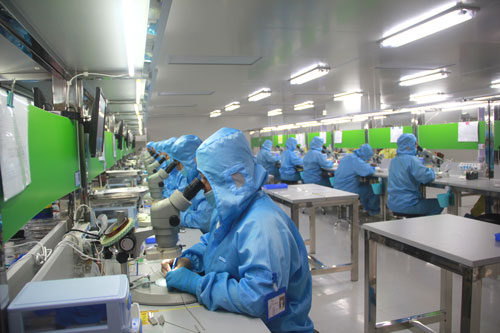China mulls minimum energy standards for LEDS

China is exploring stringent mandatory minimum energy performance standards, or MEPS, for its lighting industry.
As the country is a major exporter of LED chips, modules and luminaires, such a move would have a massive impact globally.
The China National Institute for Standardisation (CNIS) is said to be recommending MEPS to the national government, although no figures have been released on what the standard would be.
The CNIS is working with the US non-government organisation Clasp which has had success persuading governments around the world to adopt MEPS.
Despite increasing lighting efficiency, the simultaneous increase in lighting demand and consumption is driving up overall energy consumption.
In 2022, residential, commercial and industrial lighting in China together reached 990 TWh, accounting for 13 per cent of overall national electricity consumption. To meet their Net Zero 2060 target, the Chinese government must continue innovating and pushing for improved lighting efficiency.
According to Clasp, by adopting new minimum energy performance standards, China could reduce carbon emissions by 2,286 million tons by 2050. This is nearly equivalent to the emissions reductions anticipated from China’s New Energy Vehicle Industrial Development Plan. Revised MEPS align with China’s goal to phase-out mercury-containing fluorescent lighting by 2025, reducing mercury pollution by 3,466kg and saving 20.1 billion CNY/3 billion USD in energy costs.
CLASP and CNIS are collaborating to improve the current LED MEPS. The first focus will be on increasing efficiency levels for indoor LEDs to become what the organisations term ‘world leading MEPS’.
China plays a vital role in the global value chain as the world’s largest producer, consumer and exporter of LED lighting products. The country’s efforts to improve efficiency policies for LEDs will have a significant impact the global lighting supply chain – and therefore global energy consumption and carbon emissions.
‘China recognises that MEPS are one of the key drivers for improving efficiency,’ says Xiuying Liang, researcher of lighting products and program coordinator at CNIS. ‘We’re glad to work with Clasp to advance our study on the roadmap of improving China’s MEPS for LED lighting products.’
• Don’t miss Circular Lighting Live 2023, Recolight’s flagship conference and exhibition taking place on Thursday 21 September 2023 at the Royal College of Physicians in London. Free to specifiers, Circular Lighting Live 2023 will feature leading experts, specifiers and policy makers who will share their insights into forthcoming standards and legislation, emerging technologies and new business models. For 2023, the organisers have moved to a bigger venue with more expansive exhibition floor and included a dedicated track for lighting designers. More info: www.circularlighting.live


